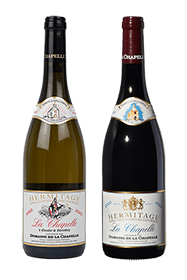Domaine de la Chapelle
For centuries, perched on a majestic hill in Tain-l'Hermitage, has stood a monument to winegrowing: Maison Paul Jaboulet Aîné. Embodying the quintessence of the great wines of the northern Rhône Valley, the estate was acquired by the Frey family in 2006. Since then, the family has overseen an exceptional heritage that includes some of the most famous terroirs in the Northern Rhône Valley, such as Les Bessards, Les Rocoules, Les Greffieux and Le Méal, all precious plots that are at the origin of the La Chapelle cuvée.
En l’honneur de ce vin emblématique, la famille Frey a décidé de créer un nouveau nom de domaine pour représenter certaines de leurs cuvées : c’est la naissance du Domaine de la Chapelle. Derrière ce nouveau nom, se positionnent deux cuvées uniques, à savoir : La Chapelle et le Chevalier de Stérimberg.
In honour of this iconic wine, the Frey family decided to create a new estate name to represent some of their cuvées: Domaine de la Chapelle was born. Behind this new name are two unique cuvées: La Chapelle and Chevalier de Stérimberg.
The year 2023 undoubtedly marked a turning point in the history of the estate, as as well as creating a new name for the domain, it also made its entry onto the Place de Bordeaux marketplace. The Frey family are very much attached to the values of Bordeaux, and have decided to entrust their two precious bottles to Bordeaux wine merchants.
The estate is undeniably a symbol of renewal, as is the philosophy applied to the estate: now in the hands of talented oenologist and winemaker Caroline Frey, the estate continues to rise and reinvent itself. The work carried out by the estate's teams, which is extremely precise and aimed at perfection, has enabled the vintages to reach an unprecedented level, with impressive ratings from critics and the international press.
A heritage which has passed through the centuries
"A great wine is always the fruit of a miracle. A miracle of geology meeting climate. A miracle of the man who senses that something is happening here and plants the right vine. A miracle, finally, for the enlightened wine-lover who, 60 years after bottling, can still marvel at the youthfulness of a wine called La Chapelle...".
In order for the miracle to take place, a mysterious knight had to intervene... In fact, it was Chevalier Henri-Gaspard de Stérimberg who embodied the genesis of the legendary estate. After taking part in the Albigensian Crusade in the 13th century, he was drawn to the singular beauty of a distant hill in the Drôme. Seeking rest and serenity after the battle, he obtained permission from Blanche de Castille to settle on the majestic hill of Tain, a green setting overlooking the Rhône. There, he built a chapel on the remains of a Roman temple: the birth of La Chapelle.
This solitary retreat inspired the name of the famous Hermitage appellation. His decision to cultivate vines would prove more fruitful than ever, as he quickly gained a reputation thanks to the pilgrims and travellers passing through. The Syrah grape, grown on this land, found its most authentic expression here and produced wines of exceptional longevity, just like those we know today. Since 1919, the Jaboulet family, then the Frey family, have cultivated the vines of this now legendary wine with passion and dedication: La Chapelle Hermitage.
An exceptional terroir: the Hermitage hill
"Geology is the soul of Hermitage," according to the estate, which resonates undeniably with the origins of the famous Rhône terroir. With its unique geology, the estate sits on a granite hillside steeped in a singular history. It was the Rhône that first isolated the famous hill from the Massif Central, but that's not all. The course of the river, the uplift of the Alps and the winds and glaciers were all natural influences that shaped the legend we know today. Over thousands of years, more than four geological eras came together in a single place, at the junction of the Massif Central and the Massif Alpine. Whether pebbles, granite or loess, this terroir offers a fascinating diversity of soils.
An innovative and sustainable approach
To achieve an ideal balance, Domaine de La Chapelle has adopted a regenerative strategy based on an in-depth knowledge of the vine and its interaction with the environment. For the estate, it is imperative to adopt a resilient approach to protecting the priceless heritage that is its terroir. This protection is characterised by constant innovation, without being limited to a single method. The experiments they have carried out on the soil, vines and wine have revealed, for example, improved soil constitution and greater resistance to water stress.
Committed to sustainable viticulture, the estate has been certified organic since 2006 and the vines have been managed biodynamically since 2018, including horse-drawn ploughing to aerate the soil, encourage microbiological life and root the vines.
The wines: signatures imprinted with finess and complexity
"You don't make a great wine, you just give it the means to reveal itself," explains Caroline Frey. For her, the grape variety reveals the terroir, but it must not take over. Syrah, Roussanne, Marsanne: the emblematic trio of the Rhône is at the heart of some exceptional wines.
La Chapelle Hermitage
From the rockier soils of Méal, Bessards, Rocoules and Greffieux, with vines aged between 40 and 100 years, the identity of La Chapelle is revealed in the final blend. Each terroir gives it its own aromatic nuances, but also remarkable elegance and structure. Vibrant and refined, this wine's persistence on the palate is as remarkable as its ability to stand the test of time.
Le Chevalier de Stérimberg
The Chevalier de Stérimberg, also known as the hermit, left his mark by naming the Hermitage hill, which is why this cuvée bears his name. Originating from loess and pebble soils, this blend of Marsanne and Roussanne is remarkably complex, with a fleshy texture and a mix of fruity and mineral aromas.


















